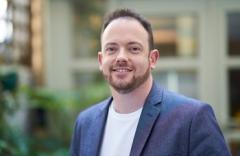You are here
- Home
- Our student stories
- James Frowen
James Frowen

Final year MBA student James, who already has a degree with The Open University Business School, explains how he has fitted studying into his busy life to transform his career. This first appeared in The Guardian.
“When I was at school, I suffered from myalgic encephalomyelitis (ME), which at the time was a misunderstood illness. Its effects are similar to glandular fever but longer lasting, and it left me feeling constantly fatigued and with recurring chest infections. The school eventually decided I needed home tutoring and, although I managed to gain the core subject GCSEs, I didn’t stay on for sixth form.
“After leaving school, I joined the police force – out of 3,300 applicants, I was one of only 30 candidates selected. But in 2005, when I had the opportunity to join the civil services at an administration grade, I became determined to progress up the ladder. After taking a few NVQ courses, I realised that if I wanted a management career, I would need a degree. Luckily, my employer was willing to sponsor me to take a leadership and management degree with the OU, and I completed it in four years, graduating with first-class honours and receiving an International Student of the Year award. It gave me a lot of confidence and opened up opportunities – by the time I graduated, I’d moved up into middle management.
“If I wanted to go further, it made sense to take an MBA. So after a year focusing on my career at Companies House in Cardiff, I enrolled with the OU again. Now in my third and final year, I have completed my exams and just have a few modules and a dissertation left to do.
“Studying with the OU is such a rewarding experience. It’s not just that the learning materials are of a high quality, though they are – it’s that the opportunity to study alongside students from other backgrounds is invaluable. On a management programme, when you are working collaboratively with people from the private sector, public sector and third sector, you are able to pick up a lot of skills.
“To get the most out of the course, I’ve had to work very hard. I’m married with a 12-year-old daughter but studying with the OU has enabled me to be flexible. Some other OU students do their work at weekends but because my own parents divorced when I was four, I didn’t want my daughter to grow up thinking ‘My father’s great but I never really saw him’. For me that family unit is absolutely essential and I try not to study when my daughter’s awake.
“That means that one day I might do my studying quite late at night, and on another I might be studying on the train to London, and that works perfectly. I couldn’t really get that in a brick-built university because I wouldn’t be able to attend the sessions. With the OU, you have face-to-face and online tutorials. If you are unable to attend, they are recorded and you can play them back.
“You have to invest time, though – you have to be committed. I work full-time and I probably do about 15 to 20 hours of study a week on top of that. Usually, I study from 8-11pm five nights a week, and I take Wednesday and Saturday nights off. If I need to squeeze in more time, I’ve got additional options. My daughter takes some clubs, such as drama and swimming, and sometimes I’ll sit there studying while she takes part in those clubs. I even manage to fit in voluntary roles, such as being a community first responder with the Welsh Ambulance Service.
“The skills you learn from the OU – the ability to organise yourself, to keep yourself motivated, to go home after work and then sit down for another three or four hours of study – change you as a person. There have been modules where I have struggled, where I thought ‘I’m never going to do this’. But they are the modules where I’ve learned the most about myself because you have that choice – you either stop or you continue – so I have applied myself wholeheartedly to it, and on some of those difficult modules I had my best results.
“Studying with the OU has made me far more confident with the approaches I take within the workplace, much more aware of strategy and the wider picture within organisations, and that has been massively beneficial. One of the key things about the OU MBA is that it takes a practice-based type of approach. So with a lot of modules, when you learn skills you practise them in the workplace, and then you critically reflect on that. Residential schools have been particularly useful because you have international students flying in, and you spend a week together in quite an intense environment. To have that insight from the third sector and private sector really does broaden your perspective and has made me a far better senior leader.
“I’m now, at 39, the head of customer delivery support, which means I’m on the corporate leadership group for Companies House. I oversee six different teams and they are all designed to support the organisation through change. Looking back over 10 years, it’s been an incredible journey. I’ve gone from managing myself when I first joined, to managing a small team, to managing large areas. Studying with the OU has been incredibly life changing. As well as the benefits to my career, it’s completely transformed me as a person."
